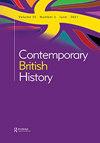没能“像戴高乐一样”?英阿关系破裂(1965-1968)和英国政策的重新评估
IF 0.6
2区 历史学
Q1 HISTORY
引用次数: 0
摘要
1965年12月18日,在罗得西亚单方面宣布独立一个多月后,阿尔及利亚与英国断绝了外交关系,以抗议工党政府决定不对索尔兹伯里的白人少数政府使用武力。在一个层面上,外交破裂似乎是次要的,到1968年4月两国关系恢复时,英国或阿尔及利亚在罗得西亚问题上的立场并没有重大变化。然而,正如本文所述,1965年至1968年间英国与阿尔及利亚关系的处理,在非殖民化时期,在第二次申请加入欧洲经济共同体(EEC)失败的时期,在外交和联邦事务部(Foreign and Commonwealth Office)成立的时期,为劳工和外交界对非洲的地位和看法提供了重要的启示。本文依次探讨了四个政策领域:罗得西亚在英阿关系中的地位;劳工接触对处理与阿尔及利亚关系的影响;危机对英法在非洲关系的影响以及法英交流对英国观点和利益演变的影响;最后,阿尔及利亚在英国外交中地位的转变。本文章由计算机程序翻译,如有差异,请以英文原文为准。
Failing to ‘do a de Gaulle’? The break in Anglo-Algerian relations (1965-1968) and the reassessment of British policy
ABSTRACT On 18 December 1965, a little over a month after Rhodesia’s Unilateral Declaration of Independence, Algeria broke off diplomatic relations with the United Kingdom, in protest at the Labour Government’s decision not to use force against the white minority government in Salisbury. On one level, the diplomatic break seemed of secondary importance, and by the time relations resumed in April 1968, there had been no significant change in Britain’s or Algeria’s position on Rhodesia. However, as this article argues, the management of Britain’s relations with Algeria between 1965 and 1968 sheds important light on the place and views of Africa in Labour and diplomatic circles, at a time of decolonisation, of a second, unsuccessful, application to the EEC and of the creation of the Foreign and Commonwealth Office. The article focuses on four areas of policy in turn: the place of Rhodesia in Anglo-Algerian relations; the influence of Labour contacts on the management of relations with Algeria; the influence of the crisis on Britain’s relations with the French in Africa and the impact of Franco-British exchanges on the evolution of British views and interests; and finally, the shifting place of Algeria in British diplomacy.
求助全文
通过发布文献求助,成功后即可免费获取论文全文。
去求助
来源期刊

Contemporary British History
HISTORY-
CiteScore
1.40
自引率
14.30%
发文量
34
期刊介绍:
Contemporary British History offers innovative new research on any aspect of British history - foreign, Commonwealth, political, social, cultural or economic - dealing with the period since the First World War. The editors welcome work which involves cross-disciplinary insights, as the journal seeks to reflect the work of all those interested in the recent past in Britain, whatever their subject specialism. Work which places contemporary Britain within a comparative (whether historical or international) context is also encouraged. In addition to articles, the journal regularly features interviews and profiles, archive reports, and a substantial review section.
 求助内容:
求助内容: 应助结果提醒方式:
应助结果提醒方式:


